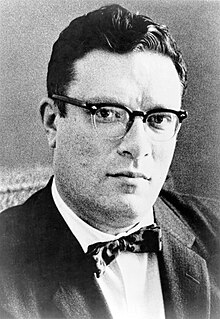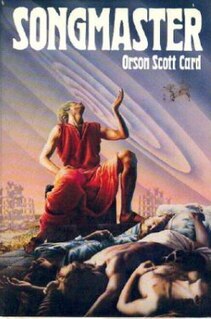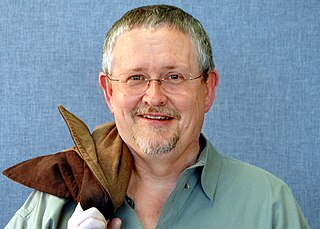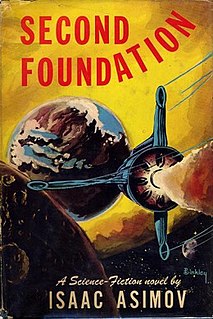
Isaac Asimov was an American writer and professor of biochemistry at Boston University. He was known for his works of science fiction and popular science. Asimov was a prolific writer who wrote or edited more than 500 books and an estimated 90,000 letters and postcards. His books have been published in 9 of the 10 major categories of the Dewey Decimal Classification.

Capitol (1979) was Orson Scott Card's second published book. This collection of eleven short stories set in the Worthing series is no longer in print. However six of the stories have been reprinted in The Worthing Saga (1990) and one of them in Maps in a Mirror (1990).

Songmaster (1980) is a science fiction novel by Orson Scott Card. The story of the Songmaster occurs in a future human empire, and follows Ansset, a beautiful young boy whose perfect singing voice has the power of amplifying people's emotions, making him both a potential healer and destroyer. He is trained in the art of singing so beautifully that his songs can express ideas and emotions more truthfully than words. This novel was based on Card's short stories "Mikal's Songbird" and "Songhouse."
Tim Pratt is a science fiction and fantasy writer and poet. He grew up in the vicinity of Dudley, North Carolina, and attended Appalachian State University, where he earned a Bachelor's in English. In 1999 he attended the Clarion East Writing Workshop. He moved to Santa Cruz, California in 2000, and currently resides in Oakland with his wife Heather Shaw and son River. He currently works as a senior editor at Locus Magazine.
"I Put My Blue Genes On" is a science fiction short story by American writer Orson Scott Card, first published in the August 1978 issue of Analog. It also appears in his short story collections Unaccompanied Sonata and Other Stories and Maps in a Mirror.

Unaccompanied Sonata and Other Stories (1980) is a collection of short stories by American writer Orson Scott Card. Although not purely science fiction and definitely not hard science fiction, the book contains stories that have a futuristic angle or are purely works of fantasy set in current times. All the stories except “The Porcelain Salamander” were first published elsewhere before appearing in the Unaccompanied Sonata collection. All eleven of these stories were later published in Maps in a Mirror.

This is a list of the works of Orson Scott Card. This list does not include criticisms, reviews, or related material written by Card. Orson Scott Card is the author of The Ender saga and Homecoming Saga among many other works.

Overclocked: Stories of the Future Present is a collection of previously published science fiction short stories and novellas by Cory Doctorow. This is Doctorow's second published collection, following A Place So Foreign and Eight More. Each story includes an introduction by the author.

Cardography (1987) is a short story collection by American writer Orson Scott Card. It contains five stories and an introduction by David G. Hartwell. All five of these stories were later published in Maps in a Mirror.
"A Thousand Deaths" is a short story by American writer Orson Scott Card. It appears in his short story collections Capitol and Maps in a Mirror. Card first published it in the December 1978 issue of Omni magazine.
"Dogwalker" is a cyberpunk short story by Orson Scott Card. It appears in his short story collection Maps in a Mirror.
"Saving Grace" is a short story by American writer Orson Scott Card. It appears in his short story collection Maps in a Mirror.
"St. Amy's Tale" is a short story by Orson Scott Card. It appears in his short story collection Maps in a Mirror.
"Holy" is a short story by Orson Scott Card. It appears in his short story collection Maps in a Mirror.
"The Monkeys Thought 'Twas All in Fun" is a short story by Orson Scott Card. It appears in his short story collections Unaccompanied Sonata and Other Stories and Maps in a Mirror.
"Gert Fram" is a short story that by American author Orson Scott Card. It appears in his short story collection Maps in a Mirror, but it originally appeared in the July 1977 fine arts issue of Ensign magazine under the pen name Byron Walley. It is Card's first published work.

Keeper of Dreams (2008) is a short story collection by Orson Scott Card. It contains twenty-two stories by Card which do not appear in his collection Maps in a Mirror. This collection was released on April 15, 2008.
"Pageant Wagon" is a short story by American writer Orson Scott Card. It first appeared his in his short story collection The Folk of the Fringe, and was followed by a release in Isaac Asimov's Science Fiction Magazine (August, 1989)










